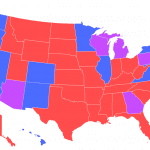In our recent post, Our Elective Monarchy, we discussed how our presidents–including the current one–have been seizing more and more power, far beyond that given them by our Constitution, and that many Americans like it that way.
The point was that our Constitutional system of democracy, the rule of law, and personal liberty is in danger, once broad commitment to those principles is lost.
According to an article on the subject, one-third of Americans (33%) have said that they would like a strong ruler unencumbered by Congress or elections. And nearly one-fourth (24%) would be fine if the military just ran the country.
I dug out that study and found that the state of Americans’ openness to authoritarianism is not quite as dire as that sounds, though it is plenty dire enough. It also had some other findings that you should know about.
The research was conducted by the Voter Study Group of the Democracy Fund, a non-partisan institute that promotes the practice of democracy. The study of citizens’ attitudes towards democracy has been carried out every year since 2017. It is distinctive because it surveys the same 5,900 Americans every year so that changes in attitudes can be tracked.
So we have data from 2017, 2018, and 2019. Thus, the latest data is from when President Trump was in office but before the 1920 presidential election.
The report on the data was published in June 2020, after the COVID lockdowns and after the Black Lives Matter protests occasioned by the death of George Floyd in police custody, but also before the election.
According to the report, entitled Democracy Maybe: Attitudes on Authoritarianism in America, written by Lee Drutman, Joe Goldman, and Larry Diamond, those statistics of 33% of Americans open to authoritarianism and 24% open to a military dictatorship refer to members of the survey group who, at one time or another during those three years, advocated those positions. The report said that quite a few respondents changed their minds over the years. This percentage, in the language of the report, can be said to “have dabbled” in authoritarianism.
It would be more accurate to say that 24% of this representative sampling of Americans in 2019 agreed with the statement that a “a strong leader who doesn’t have to bother with Congress or elections” would be a “good system of government.” And just less than one in five, 18%, believe that “army rule” would be a good system.
To be sure, 87% of the respondents said that democracy is a “good system of government,” with 77% saying that it is preferable to all of the others. Still, 47% are dissatisfied with the way democracy is working, and a significant minority is open to authoritarian alternatives.
Interestingly, the proportion of Americans supporting a strong unencumbered leader has been stable for all three years, with 24% in 2017, 23% in 2018, and 24% in 2019. And less we assume that this yearning for a strongman is an effect of Donald Trump, the report notes that this support may have actually gone down, based on other studies, one of which found 34% holding that view in 2011, when Barack Obama was president.
The study also broke down the question further according to political party. Of those who wanted a strong leader who didn’t have to deal with elections or a legislative body, 25% were Democrats and 27% were Republicans, which is statistically very close, but 39% were Independents. Breaking it down still further, of those who just wanted to do without Congress, 23% were Democrats, a whopping 39% were Republicans, and 45% were Independents. Of those who just wanted to do without elections, 24% were Democrats, only 18% were Republicans, and 35% were Independents. So it appears that Republicans are more hostile to Congress, while Democrats are more hostile to elections.
Speaking of which, we come to a particularly interesting finding. Keep in mind that this was before the presidential election and its associated controversies. A significant percentage from both parties expressed a willingness to not accept the election results if their candidate was not elected.
Respondents were given three scenarios, then asked if each was appropriate or inappropriate:
President Trump loses the election but refuses to leave office because he claimed to have credible evidence of illegal voting.
Among Republicans, 29% thought that would be appropriate. Actually, President Trump did claim to have evidence of illegal voting and, while he did leave office, he claims that he was actually the winner. And 78% of Republicans agree with that. That is far more than said they would before the election, but it shows that a significant number of Republicans were already willing to question election results.
But then again, so were Democrats, in this scenario:
The Democratic candidate loses the election but calls for a new election because there is evidence that a foreign government influenced the election:
Among Democrats, a large majority, 57%, thought that would be appropriate. This, of course, is what Democrats did believe happened in Trump’s election in 2016, that the Russians interfered with our elections and put Trump in office.
The third scenario reflects what actually happened:
A candidate calls for a new election because of winning the popular vote while losing the electoral college.
Among Democrats, 38% thought that was appropriate.
Clearly, our Constitutional democratic republic is in trouble. As the report says,
What distinguishes stable liberal democracies from their more endangered peers is not just the quality and integrity of their democratic institutions but the depth of their people’s commitment to them. Democracies are stable when citizens with diverse — and even intensely opposing — views nevertheless accept the legitimacy of their political rivals, commit to peaceful and legal means of contesting for power, and support the rules and restraints of their constitutional system.
Our national commitment to our system of government is eroding. Can anything be done to bring it back?
UPDATE: A brand new study has found that roughly two out of ten–that would be around 20%–of both Trump and Biden supporters strongly agree that it would be better if the “President could take needed actions without being constrained by Congress or court.”
(The higher percentage in the Voter Study Group study comes from adding up all who “agree” to some measure, strongly or not. In that study from just over a year ago, only 7% were strongly committed to authoritarianism. That number has apparently tripled.)
But finally we have found something that both sides in our polarized country can agree on! This recent study has even more disturbing findings. We’ll talk about those next time!
Photo via Piqsels, CC0, Public Domain














